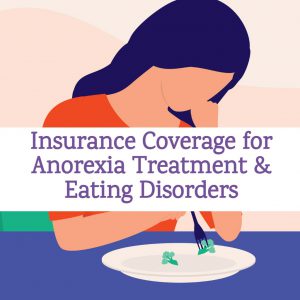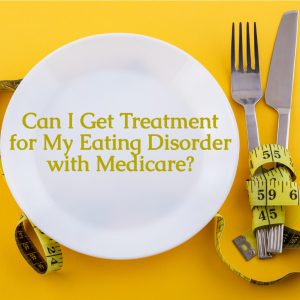National Eating Disorders Awareness Week is from February 23rd to March 1st, and we feel it’s essential that we shed light on this important topic. After all, according to the National Eating Disorders Association (NEDA), 30 million Americans struggle with eating disorders, such as anorexia, bulimia, and binge eating. This is an overwhelming amount of people that are living with eating disorders, especially considering the impact that these conditions have on people’s lives, and on the fact that they can even be fatal.
If you or a loved one are struggling with an eating disorder, you need to know how you can get help, and if your insurance will cover your treatment. So, you should know that most insurance plans will cover some form of treatment, but how much they cover will be dependent on your plan.
What Are Eating Disorders?
Eating disorders affect a person’s relationship with food and body image. People who are living with an eating disorder tend to be hyper-focused on the food they eat, their body weight or shape, and/or how they control their intake of food.
Different types of eating disorders include:
- Anorexia nervosa, which is characterized by weight loss or maintenance through extreme dieting, starvation, or too much exercise.
- Binge eating, which means frequently consuming an unhealthily large amount of food in one sitting.
- Bulimia nervosa, which can involve purging (throwing up), taking laxatives, exercising, or fasting to avoid weight gain after binge eating.
Eating Disorder by the Numbers
As stated above, eating disorders are by no means minor problems. Consider the following: 
- Eating disorders are the third most common chronic illness among adolescent females in the United States.
- A quarter of people with anorexia are male. Men have an increased risk of dying from eating disorders, because it often takes much longer to diagnose them than it does women.
- The median age of eating disorder onset is 21 for binge eating disorder and 18 for anorexia and bulimia nervosa.
- Roughly one person dies every hour as a direct result of an eating disorder.
Insurance Coverage for Eating Disorders
As we mentioned above, your health insurance should cover treatment for an eating disorder. But your insurer’s coverage might not be the same as another person’s. Coverage for treatment depends on your plan, the state you live in, and the severity of your disorder.
If you are considering seeking treatment for an eating disorder, it is important to ask the following questions of your insurance company:
- Will coverage be applied for both inpatient and outpatient care?
- Is nutritional counseling covered?
- How long will my treatment be covered for, and how many trips to rehab are covered during a policy year?
- Which providers are covered?
It is also important to think about your personal needs. For example, anorexia often warrants inpatient or partially hospitalized care. So treatment professionals can make sure you’re eating a balanced diet. Generally, health insurance companies will cover at least 10 days of inpatient rehab for eating disorders, where you can work on your mental health, and receive nutrition counseling to help foster a healthy approach to eating and food.
It is important to note that if you have a substance abuse problem accompanied by an eating disorder, some insurers will only make payments toward outpatient care when substance abuse is the primary issue.
Is Your Plan Sufficient?
One of the most important factors in getting the help you need for an eating disorder is your health insurance. Before purchasing a plan, make sure you understand what coverage it offers. And make sure it will cover evaluation and treatment.
If you’re not sure what plan is right for you, speak to an EZ agent! EZ agents are highly trained and knowledgeable and will sort through all available plans to make sure that treatments for eating disorders are covered in yours.
We offer a wide range of health insurance plans from top-rated insurance companies in every state. And because we work with so many companies we can can show you all of the plans available in your area. And we can find you a plan that saves you hundreds of dollars. Even if you don’t qualify for a subsidy. There is no obligation, or hassle, just free quotes on all available plans in your area. To get free instant quotes, simply enter your zip code in the bar above, or to speak to a local agent, call 888-350-1890.







